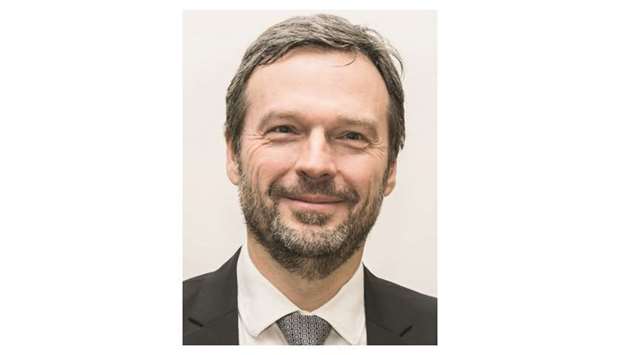The side effects of the European Central Bank’s ultra-expansionary monetary stance could eventually force policy makers to renounce a pledge to keep rates low, according to Governing Council member Pierre Wunsch.
In an interview with Bloomberg in Washington last week, the head of the Belgian central bank defended the ECB’s September decision and argued deteriorating data since then has proved those in favor of a “Full Monty” correct. At the same time, he tamed expectations for an additional dose of monetary stimulus, pointing to diminishing returns.
“We should be paying attention to the side effects of our policy and reflect on the proportionality of what we are doing,” said Wunsch, whose term started in January. “If side effects would become prominent, we may have to consider a sort of escape clause for our forward guidance. Clearly, we are not there yet.”
The ECB kept its deposit rate at -0.5% on Thursday and confirmed bond-buying to the tune of €20bn ($23bn) a month would start in November. Outgoing president Mario Draghi offered a gloomy assessment of the euro-area economy at his final press conference, pointing to prominent downside risks and weaker momentum that was delaying wage growth from boosting inflation.
Updated forecasts are due in December and may offer a clue on how long the ECB will maintain its stance. Unlike previously, quantitative easing is open ended and will only stop shortly before the first rate increase. Policymakers promised that won’t come until inflation has converged with their goal of below, but close to, 2%.
The scale of the QE plan has raised speculation that the ECB might not find enough bonds to buy. Draghi tried to alleviate concerns on Thursday, saying policymakers had plenty of room to work around the program’s legal constraints.
“There is no need for a discussion about the limits of the QE programme at the current juncture — we have time to solve that issue and there are alternative ways of dealing with it,” Wunsch said. “I don’t want to prejudge this discussion, but to me it seems that we could find ways to continue being accommodative without necessarily breaching the limits.”
Bundesbank President Jens Weidmann has already signalled that current constraints that limit buying to a third of each government’s debt are a red line for him. A public feud among the officials has also led to allegations that Draghi steamrolled the decision to restart the QE against the Governing Council’s will.
Whatever happened in September, the Governing Council needs to decide how to discuss the policy in public, Wunsch said. That would be the job for the new President Christine Lagarde, who is now free to address concerns of individual members and organise the strategy review as the stimulus decision frees up her hands, he said.
“We are currently at a bad equilibrium — it’s not what it was supposed to be, but it’s not transparent either,” Wunsch, 51, said. “What is important is to have rules of the game.”
The same applies to the imminent review of the ECB’s policy strategy, which the Belgian governor would prefer to have behind the close doors. He said policy makers appear to agree on treating the inflation target symmetrically and he would fix it at 2%.
In an indirect dig at Dutch governor Klaas Knot’s proposal of having a band around inflation target, Wunsch said there were many ways to go about the idea and the nuance was important. The key is to avoid the perception the ECB could accept lower inflation.
“It all comes down to saying that we are going to do whatever it takes to reach the objective in a symmetric way except for the counterproductive stuff,” Wunsch said. “Most of the people would agree with this objective, but their definition of what that ‘counterproductive stuff’ is differs.”
“We’ve reached the point where we need to become more structured about that,” he added.

Wunsch: For accommodative policy.
